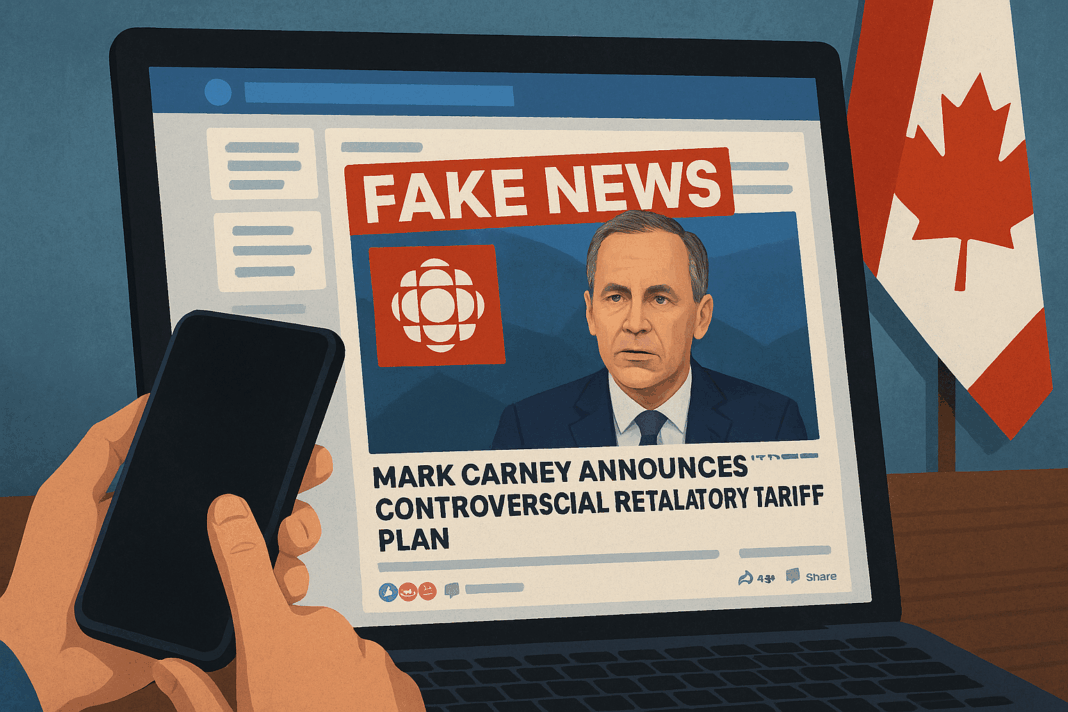As Canada prepares for its federal election on April 28, a large number of fake political posts and ads are flooding social media platforms, especially Facebook.
Concerning Fake News Spread on Social Media
More than a quarter of Canadians have come across political information online that is not real. This rise in disinformation is happening fast and is making people more divided in their political opinions.
A new report by researchers studying Canada’s media and online content has shown that these fake posts are becoming more clever and harder to recognize. Many of them look like real news stories but are actually scams. Some even use fake videos that appear to show well-known people promoting investment schemes. These scams often involve fake cryptocurrency offers and trick people into clicking on links that lead to fraud.
Despite a rule banning Canadian news from being shared on platforms like Facebook and Instagram—due to a disagreement between the government and tech companies—many Canadians still say they get political information from Facebook. This is because people often see posts from their friends, family, or candidates, or follow accounts that share political ideas. But the real, trustworthy news that used to come from professional news sources is no longer visible.
Greenland Election Results Shakes Denmark and Blow to Trump’s Expansion
Without access to verified news, people are relying on comments and shared posts that may not be accurate. This makes it harder for voters to know what is true and what is fake. It also means they might not see different points of view that help them make better decisions.
Fake Ads and Deepfakes Are Flooding Facebook
Researchers found more than 40 Facebook pages sharing fake ads. New pages are created almost every day. Some of these ads are designed to look like real news stories from top Canadian news stations. In reality, they are promoting scams or spreading false information.
Some of the most shocking examples include deepfake videos. These are computer-made videos that look and sound like real people but are completely fake. The videos show a public figure talking about a government program and urging people to sign up to receive money. However, the link in the video leads to a fake cryptocurrency investment site. These videos often carry headlines about new laws or actions in response to foreign countries, but none of it is real.
JAS-39 Gripen Rejected? U.S. May Force Canada Into F-35 Deal with No Way Out
In one case, a Facebook page using the logo of a trusted news company posted five ads in French between April 4 and April 9. These ads only ran for a few hours but were seen by thousands of people. The cost of these ads was about 1,000 Canadian dollars, and they reached close to 10,000 people. Even though the ads were short-lived, they managed to spread false content widely and quickly.
What makes the situation worse is that these false ads often do not mention that they are political. This means they don’t show up in the ad library where political ads are usually tracked. Because of this, it becomes hard for researchers and watchdogs to know how many fake ads are out there or how many people have seen them.
Concerns Over Lack of Action by Social Media Platforms
Social media platforms like Facebook say they’re working to stop scam ads and impersonation. They claim to ban fake content and are urging users to report suspicious posts. Facebook also says it’s investing in new technology to fight scams.
But experts argue these efforts are not enough. Despite platform rules, fake ads still get through. Researchers point out that such misleading content would never be allowed on TV, yet it often appears on social media without checks.
China Warns Canada Over Warship Passage Through Taiwan Strait
During Canada’s national election, this issue becomes more serious. Fake ads using the style and logos of trusted news sources are tricking voters. With real news blocked on Facebook in Canada, people have fewer ways to verify if what they see is true.
Officials are also tracking foreign influence, with some political content on apps like WeChat linked to countries like China. Still, most scams seem to be domestic. Deepfake videos and false headlines are spreading fast, shaking public trust just days before the election.

